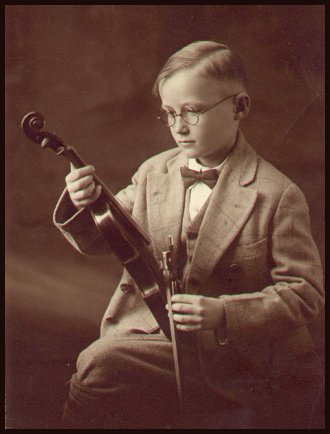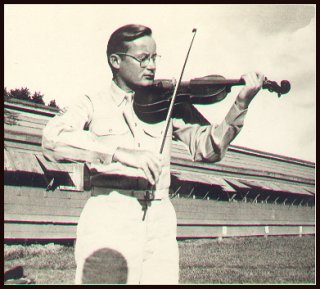May 25, 2009
Monday
Let no neglect, no ravages of time, testify to the present or to the coming generations that we have forgotten as a people the cost of a free and undivided republic.
                   — John Logan, 1826-1886, American soldier and statesman
                       from “General Order #11,” issued May 30, 1868, mandating the creation of Memorial Day
My father, Ludwig Edwin Yakimoff, was born on December 26, 1916, in Clifton Heights, Pennsylvania, a small community west of Philadelphia and not far from the city line. He had a sister Florence (whose stillborn twin did not, to my knowledge, have a name), and a brother Emil, both older than he. His parents, Emilia Bicziedeska and Karl Yakimoff, had come to America from Poland very early in the century.
I know little about my father’s ancestry. In my early teens I heard part of a story that suggests that my grandfather left his homeland in Russia during a period of what we would now call “ethnic cleansing.” Some years later I asked my father about this — he denied any knowledge of the matter and seemed so reluctant to talk about his heritage that the discussion died quickly.
As the youngest child, my father had certain advantages. By the time he was born, his parents had become established as ordinary small-town immigrant Americans, the kind of people we mean when talk about what made this country great. They sacrificed to provide their children with the means to improve their status. Evidence suggests that my grandparents had received at least a basic education and could read and write both their native language and English. They expected their children to attain higher education.
 My father was the son destined for an artistic career. He began studying violin early (this is different from “taking lessons”). His stated ambition as a child was to become “a symphony orchestra player,” although he also wrote that during his leisure time he “played baseball and practiced the violin — although not too much or too often,” and I’m assuming that the “not too much” part refers to the music practice. Nevertheless, so much was my father seen as a musician with concert soloist potential that his parents invested in the portrait you see at left, taken in 1925.
My father was the son destined for an artistic career. He began studying violin early (this is different from “taking lessons”). His stated ambition as a child was to become “a symphony orchestra player,” although he also wrote that during his leisure time he “played baseball and practiced the violin — although not too much or too often,” and I’m assuming that the “not too much” part refers to the music practice. Nevertheless, so much was my father seen as a musician with concert soloist potential that his parents invested in the portrait you see at left, taken in 1925.
Ludwig earned a degree in English from the University of Pennsylvania as well as a degree from the prestigious Curtis Institute of Music. He financed this enterprise with scholarships and stints as a strolling violinist at swanky city restaurants such as Old Original Bookbinder’s on the waterfront. Upon graduation, however, he must have realized that a career as a classical musician was as uncertain as that of an actor, so he sought work as a teacher.
In the fall of 1941 Ludwig signed on with the Ridley Township Board of Education as a teacher of English and music. And then came Pearl Harbor, and my father tried to do what immigrant sons were encouraged to do — give something back to the country which had provided so much opportunity. He volunteered for military service but was rejected because of his poor eyesight, specifically a flaw that compromised depth perception and rendered his left eye virtually nonfunctioning.
Within a year, however, the war effort intensified and every available fighting man was deployed to some theater of operations. People like my father, who had teaching experience and a minor in Spanish, became useful to the military. In the fall of 1942 he was inducted into the Army and sent to the training facility at New Cumberland, Pennsylvania (two miles across the bridge from downtown Harrisburg) to prepare for work as an instructor.

He never talked much about his military service, and I assumed there was little to tell. At right is a picture from those Puerto Rican days. It represents the major impression I have always carried of my father’s war experience. I imagined him basking in sunny Puerto Rico living a teacher’s life not unlike the one he would have had at home.
I came of age as part of the Vietnam protest generation. I didn’t value military service, volunteer or otherwise. I knew that most men in combat situations suffered terrible psychological and physical trauma, and I wished that all could be spared such things. I knew my father’s service had been honorable and useful, but I did not view him as a hero to be honored for great sacrifice. After all, you’ll never see a movie called “Saving Sergeant Yakimoff” or “Full Metal Violin Case.”
In 1999 I came into possession of the letters my husband’s uncle wrote home from his duty stations in 1943 and 1944. Like my father, Uncle Flash had a non-combat job. His Army Air Corps squadron served on an island in the South Pacific, repairing and maintaining battle-damaged B-24 and B-25 bombers.
Calling Guadalcanal “an island in the South Pacific” conjures movie images of swaying palm trees and graceful seabirds soaring over sparkling water. Flash’s letters reveal a young man far from home who missed his sisters, suffered mild depression, and would have traded any mosquito-fogged island sunset for the opportunity to shovel snow off the sidewalks of Hershey, Pennsylvania. Surely my father experienced the same emotions. The soldier’s lot is lonely and heroic, no matter his situation.
Today is the official 2009 observance of Memorial Day in the United States. Formerly called “Decoration Day” for the practice suggested by Congressman John Logan of visiting cemeteries to “gather around the sacred remains [of fallen soldiers], and garland the passionate mounds above them with the choicest flowers of spring-time,” the observance sprang up after the Civil War to honor the Union dead. After World War I, it expanded to include American casualties of any war or military action. In popular practice, it honors all deceased persons who have served in the military. Originally observed on May 30, the date was shifted to the last Monday in May in the 1970s as a push to create convenient three-day holiday weekends. Many people believe that this shift has diluted the meaning of the holiday, making it just another excuse to sit around the backyard grilling hot dogs and drinking beer. Many others don’t care.
When my father died in June of 1985, he and my mother were in Virginia, en route home to Florida from a month-long visit with me and my sister. My mother had his body returned to Pennsylvania for a funeral in the parish they’d last belonged to here and burial in her hometown, about 75 miles from here. As a veteran, he was entitled to a flag to drape his coffin and a military marker for his grave. But any proof of this entitlement was resting in a safe deposit box in a bank in Florida. I offered to contact a classmate who as a state representative and a veteran himself helps people with matters such as this, but my mother declined. I was pregnant and carrying other issues as a survivor/daughter as well. I did not press the matter.
In the 24 years since my father died I have changed in many ways. As a mother, I’ve taken a look at my values and how they have informed my perceptions. As a historian I’ve learned more about what it meant to be alive during World War II, as a soldier or a civilian.
My sister and I usually visit our parents’ gravesite in early June. The cemetery is dotted then with crisp new American flags, each in a holder appropriate to the campaign in which it was earned, placed annually at veterans’ graves by, probably, the Veterans of Foreign Wars. Every year I remind myself that my father’s grave should have one, but doesn’t because no one has ever informed any proper agency that such a privilege has been earned. And every year I resolve to follow up on this last detail that I now firmly believe I owe him.
But then I get attracted by or distracted by other concerns. In the days following Memorial Day I’m usually oh so very busy getting ready for my August gallivant, planning visits to friends in Connecticut and New Hampshire whose homes lie along the way to Vermont, finding or creating a short piece to give in my slot at the Blue Parlor contributors’ readings at Bread Loaf, working on revisions to the piece that has already been deemed suitable for discussion at workshop.
I didn’t think of my father’s undecorated grave until the middle of last week, too late, once again, for anything to be done this year. My rejection by Bread Loaf this year has caused me to examine the ways in which I have become lazy, complacent, not doing my best work or becoming my best self. Â
I’ve put “Call Mahanoy City veterans’ org” on a sticky note in my planning book for this week, along with the notes about the ways I’m going to get back into my writing. Having written that sentence, I’m stumped for how to proceed to an ending. I think, for now, I’ll go walking in a local cemetery, rest and remember, and try to draw some inspiration from those who rose to challenges, did what they were called to do, and whose perpetual light now shines on me.
Love it? Hate it? Just want to say hi?
To comment or to be included on the notify list, e-mail me:
margaretdeangelis [at] gmail [dot] com (replace the bracketed parts with @ and a period) OR
Follow me on Twitter: http://twitter.com/silkentent